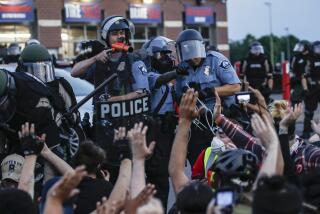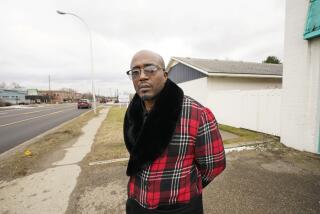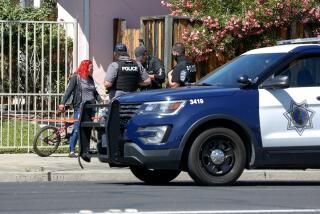Police debate Obama’s remark
To some police officers, President Obama was merely speaking the truth about how a certain department behaved in a difficult situation. To others, he committed the unpardonable sin of sticking his nose where it does not belong.
When Obama accused Cambridge, Mass., police officers Wednesday of acting “stupidly” when they arrested his friend, Harvard University scholar Henry Louis Gates Jr., he reignited smoldering feelings in departments across the country about race, police practices and citizen obligations.
Gates accused the officer of racism, a charge the officer denied.
Two well-known retired police chiefs -- Norm Stamper of Seattle and Joseph McNamara of San Jose -- agreed that Obama’s language was inflammatory. Though Stamper said the president’s candid remark could provoke some necessary self-examination by police officers, McNamara took a different view.
“My personal belief is that had Professor Gates been white, the outcome would have been different,” Stamper said. Although the incident could have ended in a handshake and “maybe even a couple of chuckles . . . it ended up becoming a huge national issue.”
Stamper said Gates was acting as “a true American” -- somebody who has “a healthy skepticism about authority.” The officer “lured him outside . . . and cuffed him up.”
McNamara said he thought the officer had acted appropriately right up until the moment he decided to arrest Gates, which he thought unnecessary. But Obama, he said, made a big mistake.
“He really hurt the police terribly,” said McNamara, a research fellow at Stanford University’s Hoover Institution. “What bothers me is the tremendous stature that President Obama has with the minority community.” Obama’s comment, he said, will lead to “a very unfortunate and tremendous setback for police efforts that have been impressive over the 50 years since I became a policeman.”
Obama, McNamara said, “spoke with his heart and not with his head, as he should have -- as an attorney and the president of the United States.”
But to Atlanta Police Officer Antonio Matos, who is black, even if Gates had berated Cambridge Sgt. James Crowley, as alleged in the police report, “that should have been the end of it. In our profession we’re supposed to have thick skin. You can’t take things personally.”
The incident at Gates’ house on July 16 unraveled quickly.
According to an interview Gates gave to the Root, an online magazine about black issues that he edits, he discovered that the front door of his home was jammed when he returned from a trip to China. He asked his limo driver, “a large black man,” to help him jimmy open the door. Someone saw the men and called police.
Gates, who said his home is owned by Harvard, was on the phone with the university to fix the door when police arrived. He answered the door but refused to step onto his porch as the officer requested. “All the hairs stood up on the back of my neck,” he said, “and I realized that I was in danger.”
He said to prove he was in his own home, he showed his driver’s license and Harvard identification to Crowley, and became angry when the officer refused to provide his name and badge number.
Police arrested and handcuffed Gates, director of Harvard’s W.E.B. Du Bois Institute for African and African American Research, and charged him with disorderly conduct. According to the police report, Gates “refused to be cooperative” and shouted “this is what happens to black men in America.”
Gates spent four hours in jail, but on Tuesday authorities said the charges had been dropped. Cambridge’s mayor apologized to Gates, calling the incident “regrettable and unfortunate.”
Crowley, who arrested Gates, told a Boston radio station Thursday that he thought Obama went too far.
“I think he was way off base wading into a local issue without knowing all the facts, as he himself stated before he made that comment,” he said.
Crowley, who according to the Associated Press teaches a police training course in racial profiling, said he would not apologize, because he thought he had acted appropriately.
Carol Sobel, a Los Angeles civil rights lawyer who used to work for the American Civil Liberties Union and has often represented plaintiffs against police, said she thought Obama made “a fair comment, and one probably born out of his own experience.”
But was the incident racial profiling? Sobel said it’s more complicated than that.
“It probably involves a degree of racial profiling, but it cuts across race.” Officers, she said, “have a badge and a gun, and they are going to exercise their authority.”
Verbal insolence is sometimes called “contempt of cop,” she said, and offended officers may use the catchall “disorderly conduct” charge to make an arrest. But, she said, “you cannot commit the crime of disorderly conduct in your own home.” Nor is it illegal to curse or flip the bird to a police officer.
“The law is clear,” McNamara said. “You can’t be guilty of disorderly conduct simply because you are saying bad things to a police officer.”
When Stamper was an officer in the San Diego Police Department, one training tool was a book called “Verbal Judo: The Gentle Art of Persuasion,” by George Thompson.
“He said, ‘Any cop can handle nice guys and wimps,’ ” Stamper said. “ ‘If you want to be seen as a really good cop, show me what you can do when somebody says no when you tell them to roll down their window and provide their driver’s license.’ That stuck with me and a whole lot of police officers who now pride themselves on being able to defuse volatile situations.”
Gates, for his part, told the Root that he is still stunned by his arrest. “There haven’t been fundamental structural changes in America. . . . The only black people who truly live in a post-racial world in America all live in a very nice house on 1600 Pennsylvania Avenue,” he said.
--
kim.murphy@latimes.com
Times staff writers Joel Rubin and Richard Fausset contributed to this report.
More to Read
Start your day right
Sign up for Essential California for news, features and recommendations from the L.A. Times and beyond in your inbox six days a week.
You may occasionally receive promotional content from the Los Angeles Times.







